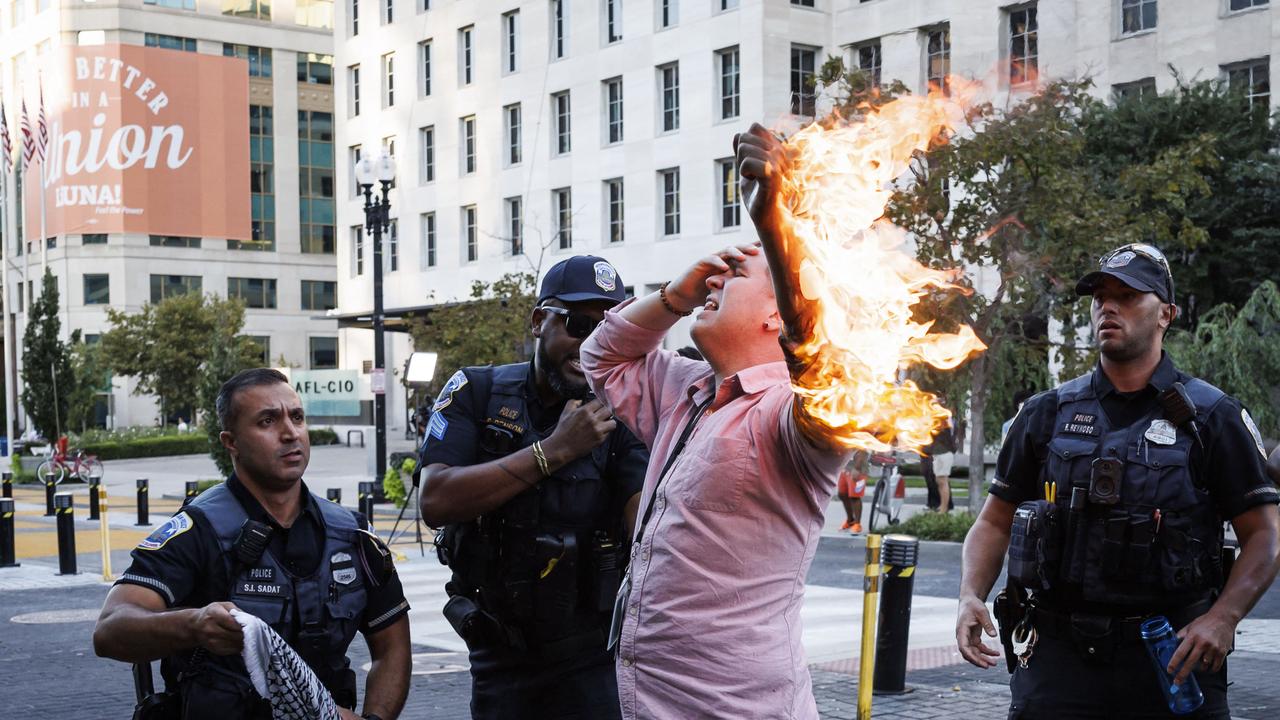Scottish dream of independence over ‘for a generation’
SCOTLAND’S dream of independence has been settled “for a generation” after its resounding No vote, Britain’s Prime Minister says.

THE question of Scottish independence has been settled “for a generation”, Britain’s Prime Minister said as he welcomed Scotland’s decision to remain within the Union.
Speaking in Downing St in a televised address to the nation, after Scotland delivered a resounding no to their First Minister’s dream of independence, David Cameron insisted there would be “no debates, no re-runs”.
“The debate has been settled for a generation,” he said.
Minutes earlier Scotland’s leader Alex Salmond had, in a speech conceding defeat, insisted that Scotland could look forward to independence at some stage in the future.
Speaking as results from 31 out of 32 councils showed the No campaign had won 55.4 per cent compared with 44.6 per cent for the Yes camp, he pointed out: “1.6 million voters is a substantial vote for the independence and future of this country”.
Election officials reported a record UK turnout of 84.6 per cent.
Mr Salmond vowed to hold the British government to its promise of devolution, and Mr Cameron made it clear in his own address that he had listened to the Scots’ demand for greater powers.
He was “delighted” that Scotland had decided to keep the four countries of the Union together, he said. But he promised: “We have delivered on devolution in this government and we shall do so again in the next parliament.”
The pound surges with the No campaign
At counting centres across Scotland, there were loud cheers and clapping from smiling “No” campaigners, with some unfurling the British Union Jack flag.
As the results became clear Mr Salmond, who had driven the Yes campaign with unflagging passion, tweeted: “Well done to Glasgow, our Commonwealth city, and to the people of Scotland for such incredible support.”
Earlier, the deputy leader of the pro-independence Scottish National Party became the first senior leader in the Yes camp to admit that they had lost.
“Like thousands of others across the country I’ve put my heart and soul into this campaign and there is a real sense of disappointment that we’ve fallen narrowly short of securing a yes vote,” Nicola Sturgeon, told the BBC.
The outcome will be a huge relief for Mr Cameron, who many suggested could not have survived if he oversaw the breakup of the 300-year-old United Kingdom.
Mr Cameron tweeted: “I’ve spoken to Alistair Darling — and congratulated him on a well-fought campaign.
However he now risks rebellion from his own MPs if he offers too many powers to Scotland. Following his promise — made jointly with Ed Miliband and Nick Clegg — of further devolution to the Scottish parliament, he has come under intense pressure from English MPs concerned that their constituents are being sidelined.
In his speech Mr Cameron stressed that the UK would move forward with a “balanced settlement,” that was not just fair to people in Scotland but: “Importantly to everyone in England, Wales and Northern Ireland as well.”
INTERACTIVE: What would an independent Scotland look like?
Deputy Prime Minister Nick Clegg made it clear that the promises of devolution would be kept. “A vote against independence was clearly not a vote against change and we must now deliver on time and in full the radical package of newly devolved powers to Scotland.”
Mr Cameron added: “Just as the people of Scotland will have more power over their affairs, so it follows that the people of England, Wales and Northern Ireland must have a bigger say over theirs.”
Early in the day the Union got a head start with an exit poll by the pollster YouGov indicating that the Unionists would carry the day by a 54 to 46 per cent margin.
The survey of 1828 voters polled after they had cast their ballots and of 800 postal voters is in line with similar surveys in recent days, although around Scotland those involved on both sides insisted the election remained on a razor’s edge.
Fear and Lothian as tensions spill over in Glasgow
Huge crowds of Yes supporters in Edinburgh anxiously awaiting updates in the count became subdued when the first numbers were announced about four hours after the polls closed.
Counting in the electorates of Shetland, Clackmannanshire and the Orkney Islands put the No vote ahead with 59.17 per cent of the vote, compared to 40.83 per cent for Yes. Dundee, and West Dunbartonshire voted Yes early on but they were outweighed by the No camp as region after region fell to the Unionists.
Earlier, casting his ballot in his Aberdeenshire constituency, Mr Salmond had called the referendum a “once-in-a-lifetime opportunity” for the Scottish people. “We’re in the hands of the people of Scotland and there’s no safer place to be than in the hands of the Scottish people,” he said.
His Yes campaign had mobilised tens of thousands of supporters: in Edinburgh, a flame-blowing piper from Las Vegas led voters through the streets of a housing state, like a Pied Piper pulling the voters to their destiny.
TIMELINE: Scottish nationalists’ long fight to break from Britain
The campaign has fired up many Scots who have previously taken little interest in politics and has revolved around questions of national identity that are rarely discussed in Britain.
Throughout the day, the importance of the vote was lost on no one. James Wheldon woke early on Thursday and hit the streets in a rented van plastered with posters urging voters to back Scottish independence, though he knew there was no need to remind voters to get out and vote. A record-breaking 97 per cent of those eligible to vote registered to take part in the one-question ballot.
The participation rate or 84 per cent far surpassed the 64 per cent who turned out for the General election in 2010. In the most recent Scottish parliamentary elections, just more than 50 per cent of registered voters made it to the polls.
In Glasgow, the count was overshadowed by complaints of fraud, after 10 people said they had turned up to vote only to find that their name had already been recorded as having voted.
Better Together spokesman Blair McDougall said: “The turnout will give whoever wins a clear mandate for Scotland, and any irregularities will be taken seriously,’’
But he said the irregularities were small and needed be put in proportion to the scale of the turnout.
Yesterday, one of Scotland’s most famous sportsmen, tennis star Andy Murray, appeared to lend his support to separation in a last-minute tweet accusing the “No” campaign of negativity.
“Let’s do this!” wrote Murray, who no longer lives in Scotland, echoing a slogan raised by pro-independence First Minister Alex Salmond in a final fiery campaign speech.
Mr Cameron had pleaded with Scots to vote in favour of keeping “our home” and has warned the breakup would be a “painful divorce” full of economic risks.
Back in Downing St, he insisted he would not resign if the Yes vote prevailed.
“My name is not on the ballot paper,” he said. “What’s on the ballot paper is ‘does Scotland want to stay in the United Kingdom, or does Scotland want to separate itself from the United Kingdom?’.’’
With AAP/AFP



